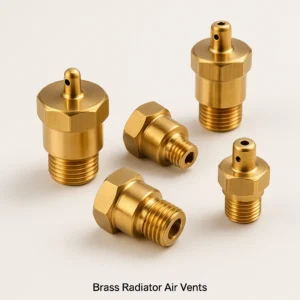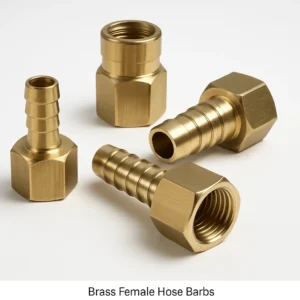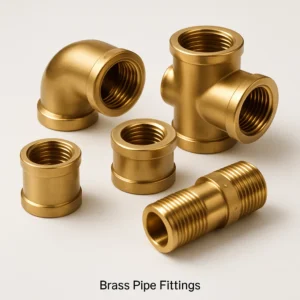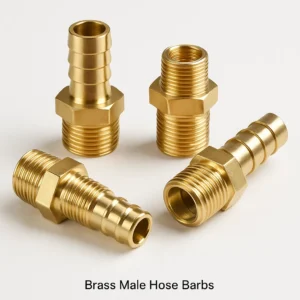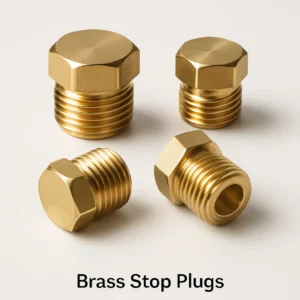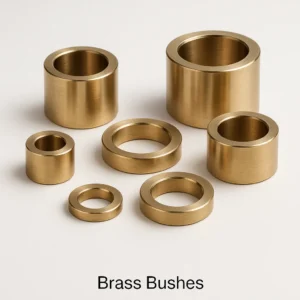Comprehensive Overview of Forged Brass Manifolds
We are one of the leading manufacturers and exporters of Forged Brass Manifolds, Hot Forged Brass Distribution Manifolds, and Custom Brass Manifold Blocks from India. We have been supplying high-quality forged brass plumbing manifolds, brass radiant heating manifolds, brass compressed air manifolds, brass hydraulic manifolds, brass water distribution manifolds, brass HVAC manifolds, and custom brass manifold assemblies to the world market for many decades. Our state-of-the-art manufacturing facility specializes in producing premium forged brass manifolds using advanced hot forging, CNC machining, threading and boring operations, leak testing, pressure testing, and comprehensive quality control systems. With over three decades of global experience in brass forging and manifold manufacturing, we serve diverse industries including plumbing and water distribution (residential and commercial manifolds, water meter manifolds, potable water systems), radiant floor heating (underfloor heating manifolds, hydronic heating distribution), HVAC and refrigeration (chilled water manifolds, heating system distribution, zone control), compressed air systems (air distribution manifolds, pneumatic tool manifolds, factory air lines), hydraulic and industrial (hydraulic valve manifolds, oil distribution blocks, industrial fluid distribution), fire protection (sprinkler system manifolds where approved), irrigation and agriculture (water distribution manifolds, drip irrigation headers), and general engineering (custom fluid distribution, multi-port manifolds, process equipment). Our expertise encompasses working with various brass alloys including DZR Brass CW602N (dezincification resistant for hot water, 20-40 year service life), Free Cutting Brass C36000 (excellent machinability for hydraulic manifolds), Lead-Free Brass (NSF/ANSI 61 compliant for potable water), Yellow Brass C85800 (economical general purpose), Naval Brass C46400 (marine applications), and custom brass alloys meeting specific requirements. We manufacture forged brass manifolds ranging from 2-port to 24-port configurations, sizes 1/2 inch to 4 inch main bore (DN15 to DN100), port sizes 3/8 inch to 2 inch (DN10 to DN50), lengths 50mm to 2000mm, maintaining pressure ratings 150-600 PSI (PN10-PN40), thread types NPT, BSP, metric, excellent leak-proof performance, dimensional accuracy ±0.5-1.5mm, compliance with ASME B16.11, DIN standards, ISO 9001, and reliable 15-30+ year service life in plumbing, heating, hydraulic, and industrial distribution applications.
What are Forged Brass Manifolds?
Forged Brass Manifolds are multi-port distribution blocks manufactured from solid brass billets through hot forging process, providing single-inlet multiple-outlet fluid distribution for water, air, hydraulic oil, glycol, refrigerant, and other compatible fluids. Forging process creates superior grain structure resulting in higher strength, pressure capability, and reliability versus cast or machined-from-bar manifolds.
Key Features and Benefits
Superior Strength: Hot forging creates directional grain flow following manifold contours, 20-30% higher tensile strength versus cast brass, 15-20% higher versus machined from bar, pressure ratings 200-600 PSI achievable, suitable for high-pressure hydraulic and industrial applications, reduced wall thickness possible saving material and weight.
Pressure Integrity: Dense defect-free structure from forging eliminating porosity inherent in castings, excellent pressure tightness for hydraulic and plumbing applications up to 60 bar (900 PSI), leak-free performance critical for concealed installations (underfloor heating, in-wall plumbing), pressure testing 1.5-2× working pressure standard, suitable for critical applications.
Dimensional Consistency: Forging dies ensure consistent dimensions part-to-part, ±0.5-1.0mm tolerance achievable on critical dimensions, uniform port spacing critical for valve and actuator mounting, suitable for automated assembly and installation, reduced on-site fitting and adjustment.
Corrosion Resistance: Brass alloys provide excellent corrosion resistance in water, glycol, air, hydraulic oil applications, DZR brass for hot water systems 20-40 year service life >60°C, lead-free brass for potable water NSF/ANSI 61 compliant, naval brass for marine and coastal applications.
Multiple Port Configurations: 2-port to 24-port manifolds available standard, custom configurations 30+ ports for special applications, port sizes 3/8″ to 2″ (M10×1 to M30×1.5 metric, 3/8″ to 1-1/2″ NPT), port spacing optimized for valves and actuators (typically 35-60mm centers), inlet/outlet sizes 1/2″ to 4″ (DN15-DN100).
Integrated Features: Built-in ball valves or isolation valves on each circuit, flow meters and adjustment valves (for radiant heating), drain and fill ports, air vent and purge connections, pressure/temperature gauge ports, mounting brackets and feet, thermometer wells, balancing valves.
Versatile Connection Types: NPT threaded ports (North America standard), BSP/BSPP threaded ports (Europe/UK standard), metric threaded ports M10×1, M12×1.5, M14×1.5, M16×1.5, M20×1.5, M24×1.5, M30×1.5 (European radiant heating standard), compression fittings for copper tubing, push-to-connect fittings for PEX tubing, barbed hose connections, flanged connections for large manifolds.
Forging Process for Brass Manifolds
Hot Forging Process
Billet Preparation: Solid brass billets cut to required length based on manifold size and weight, typical billet dimensions 40-150mm diameter × 100-600mm length, billets heated in induction or gas furnaces to forging temperature 700-850°C (1290-1560°F) depending on brass alloy, uniform heating ensuring proper material flow during forging.
Forging Operation: Heated billet placed in forging die (closed-die forging), hydraulic press 300-3000 tons force forming manifold shape, single or multiple strikes depending on complexity, brass flows into die cavity creating manifold body with port bosses, flash (excess material) formed at parting line trimmed after forging, forging creates directional grain structure following part contours.
Trimming and Cleaning: Flash removed by trimming dies or cutting operations, scale and oxide removed by shot blasting or pickling, manifold blanks inspected for forging defects (cracks, laps, underfill), dimensional verification before secondary operations.
Heat Treatment (Optional): Stress relief annealing 250-400°C for 1-3 hours relieving residual forging stresses, improves machinability and dimensional stability, air cool to room temperature, not always required for brass manifolds depending on alloy and application.
Secondary Machining: CNC machining operations on forged blanks, facing end surfaces achieving flatness <0.2mm for gasket sealing, drilling and boring port holes to precise dimensions and perpendicularity, threading operations NPT, BSP, or metric threads per specifications, counterboring for O-rings or gaskets, drilling mounting holes, engraving or laser marking port numbers and specifications.
Finishing Operations: Deburring and edge breaking, vibratory tumbling or manual deburring, surface finishing (polishing, brushing, coating), protective coating application where specified (nickel plating, powder coating, lacquer).
Assembly (If Required): Ball valves or isolation valves installed in ports, flow meters and adjustment mechanisms assembled, pressure/temperature gauges installed, end caps and plugs, mounting brackets attached, factory pre-assembled manifolds ready for installation.
Testing and Inspection: Pressure testing hydrostatic or pneumatic to 1.5-2× working pressure (typical 450-900 PSI test), leak detection on all ports and joints, dimensional inspection critical dimensions, thread inspection Go/No-Go gauges, visual inspection surface quality, functional testing valves and meters operate correctly.
Forging Versus Alternative Manufacturing
Forged Versus Cast Brass: Forging 20-30% higher strength enabling thinner walls and weight reduction, superior pressure integrity eliminating casting porosity, better dimensional consistency ±0.5-1.0mm versus ±1.5-3.0mm casting, finer grain structure improving mechanical properties, higher initial tooling cost ($3,000-15,000 dies versus $500-3,000 patterns), economical for volumes >500 pieces annually.
Forged Versus Machined from Bar: Forging 30-50% material savings versus machining from solid brass bar (critical for expensive alloys), faster production for complex geometries, superior grain flow versus machined interrupted grain, lower cost for medium to high volumes >200 pieces, machining from bar advantages for low volumes <200 pieces, very complex internal passages, prototype/custom one-offs.
Forged Versus Fabricated (Welded): Forging single-piece construction eliminating welded joints and potential leak paths, higher pressure rating and reliability, better corrosion resistance (no heat-affected zones), superior appearance and finish, fabricated advantages for very large manifolds >2000mm length, very low volumes, special configurations.
Brass Alloys for Forged Manifolds
DZR Brass CW602N (Dezincification Resistant)
Composition: 58-60% Cu, 36-38% Zn, 1.6-2.5% Pb, 0.02-0.15% As (arsenic prevents dezincification). Mechanical Properties: Tensile strength 400-500 MPa, yield strength 200-320 MPa, elongation 18-30%, hardness 95-125 HB, excellent hot formability. Dezincification Resistance: Arsenic addition forms protective layer, dezincification depth <0.2mm per ISO 6509 (20 days @ 75°C test), 20-40 year service life in hot water >60°C continuous. Applications: Radiant floor heating manifolds (hydronic heating 40-90°C), domestic hot water distribution manifolds, commercial hot water recirculation systems, European plumbing manifolds (mandatory in many countries per EN 1254), solar thermal heating systems, boiler and heat exchanger manifolds. Forgeability: Excellent hot forging characteristics, good machinability 70% rating. Cost: Premium 15-25% over standard brass, essential for hot water and European markets. Standards: EN 12165, ISO 6509, DIN 50930-6.
Free Cutting Brass C36000 (CDA 360)
Composition: 61.5% Cu, 35.5% Zn, 3% Pb. Mechanical Properties: Tensile strength 340-420 MPa, excellent machinability (100% rating standard), moderate hot forgeability. Applications: Hydraulic manifolds requiring extensive CNC machining (multiple drilled passages, threaded ports), compressed air manifolds with complex port configurations, industrial fluid distribution blocks, precision machined manifold blocks for hydraulic valves. Forgeability: Good hot forging but typically machined from bar for complex hydraulics, lead content improves chip breaking and surface finish in machining. Machinability: Best of all brass alloys, critical for manifolds requiring extensive secondary machining. Limitations: Not suitable for hot water (dezincifies), not approved for potable water in many jurisdictions due to lead content. Cost: Baseline for brass alloys, economical for industrial applications. Standards: ASTM B16, SAE J461.
Lead-Free Brass (NSF/ANSI 61 Compliant)
Composition: Various formulations <0.25% Pb (bismuth brass, silicon brass formulations), typically 85% Cu, balance Zn, Bi, Si. Mechanical Properties: Tensile strength 300-380 MPa, good hot forgeability, machinability 65-75% rating (inferior to leaded brass but acceptable). Dezincification Resistance: Lead-free formulations achieve good DZR properties meeting ISO 6509 <0.3mm depth. Applications: Potable drinking water distribution manifolds (North America mandatory EPA requirement), residential and commercial plumbing manifolds, water meter manifolds, water treatment and filtration system manifolds, food processing and beverage equipment manifolds, any application with drinking water contact. Certification: NSF/ANSI 61 certified for drinking water system components, leaching tests demonstrate lead content <5 ppb in water. Forgeability: Slightly more challenging than leaded brass, requires optimized forging parameters, good for manifolds with moderate complexity. Cost: Premium 20-35% over leaded brass, regulatory requirement driving adoption, mandatory for potable water North America since January 2014. Standards: NSF/ANSI 61, EPA lead-free requirements, ASTM F2623 (lead-free wrought brass).
Yellow Brass C85800 (85-5-5-5 Bronze/LG2 Gunmetal)
Composition: 85% Cu, 5% Sn, 5% Pb, 5% Zn. Mechanical Properties: Tensile strength 230-280 MPa, moderate forgeability, good castability (if cast manifolds alternative). Applications: Economical manifolds for cold water, compressed air (non-critical), general industrial fluids where DZR not required, lower-pressure applications <150 PSI, suitable for indoor protected environments. Limitations: Not suitable for hot water (no DZR properties), contains lead (5%) not approved many potable water jurisdictions. Cost: Economical baseline, suitable where superior properties not justified. Standards: ASTM B62, BS 1400 LG2.
Naval Brass C46400
Composition: 60% Cu, 39.25% Zn, 0.75% Sn. Mechanical Properties: Tensile strength 380-480 MPa, excellent hot forgeability, good machinability 60% rating. Corrosion Resistance: Superior marine and seawater corrosion resistance, excellent for coastal and offshore applications, resistant to stress corrosion cracking in marine environments. Applications: Marine water distribution manifolds on ships and boats, offshore platform manifolds, coastal facility water systems, desalination plant manifolds, marine HVAC manifolds, marina water distribution. Cost: Premium 15-25% over standard brass, justified for marine environments. Standards: ASTM B21 (rod/bar), applicable alloy for forged components.
Brass Alloy Selection for Manifold Applications
| Application | Recommended Alloy | Key Reason | Service Life | Relative Cost |
|---|---|---|---|---|
| Hot Water (Residential) | DZR Brass CW602N or Lead-Free DZR | Hot water >60°C, dezincification resistance | 20-40 years | +15-35% |
| Cold Potable Water (USA/Canada) | Lead-Free Brass NSF/ANSI 61 | EPA mandate <0.25% lead | 20-35 years | +20-35% |
| Cold Potable Water (Europe) | DZR Brass CW602N | EN standards, good corrosion resistance | 20-40 years | +15-25% |
| Radiant Floor Heating | DZR Brass CW602N | Hot water/glycol 40-90°C, reliability | 25-40 years | +15-25% |
| Hydraulic Manifolds | C36000 Free Cutting | Machinability for complex passages | 15-30 years | Baseline |
| Compressed Air | C36000 or C85800 | Adequate strength, economical | 20-30 years | Baseline |
| Marine/Coastal | Naval Brass C46400 | Seawater corrosion resistance | 20-40 years | +15-25% |
| Industrial Water (Non-Potable) | C85800 Yellow Brass | Economical, adequate properties | 15-25 years | Baseline |
Manifold Configurations and Specifications
Port Configurations
2-Port to 4-Port: Small manifolds for simple distribution, residential heating zones, small compressed air systems, sizes 1/2″ to 1″ inlet, 3/8″ to 3/4″ ports. 6-Port to 12-Port: Standard residential and commercial manifolds, radiant floor heating (6-12 zones typical), plumbing manifolds serving multiple fixtures, compressed air distribution, sizes 3/4″ to 1-1/2″ inlet, 1/2″ to 1″ ports. 12-Port to 24-Port: Large commercial and industrial manifolds, multi-zone radiant heating, commercial plumbing, factory air distribution, sizes 1″ to 3″ inlet, 1/2″ to 1-1/4″ ports. Custom 24+ Ports: Special applications requiring extensive distribution, industrial process systems, large commercial buildings, sizes 2″ to 4″ inlet, custom port sizes and spacing.
Inlet/Outlet Sizes
Small Manifolds: 1/2″ or 3/4″ (DN15-DN20) inlet/outlet, suitable for residential applications 5-20 GPM, port sizes 3/8″ to 3/4″ (M10×1 to M24×1.5). Medium Manifolds: 1″ to 1-1/2″ (DN25-DN40) inlet/outlet, commercial applications 20-60 GPM, port sizes 1/2″ to 1″ (M16×1.5 to M24×1.5). Large Manifolds: 2″ to 4″ (DN50-DN100) inlet/outlet, industrial applications 60-300+ GPM, port sizes 3/4″ to 2″ (M20×1.5 to M30×1.5).
Port Spacing and Layout
Standard Spacing: 35mm centers (metric radiant heating standard), 40mm centers, 50mm centers (North American common), 60mm centers (large valve mounting). Compact Spacing: 25-30mm centers for space-constrained applications, requires smaller valves and actuators. Variable Spacing: Custom port positions for specific valve or equipment mounting, asymmetric layouts accommodating existing installations.
Thread Types
NPT Threads (ASME B1.20.1): 1/4″ NPT to 2″ NPT ports, tapered threads for mechanical seal, dominant in North America, inlet/outlet 1/2″ to 4″ NPT. BSP Threads (ISO 228, ISO 7): G1/4″ to G2″ parallel (BSPP) or R1/4″ to R2″ tapered (BSPT), UK and Commonwealth markets, inlet/outlet G1/2″ to G4″. Metric Threads: M10×1, M12×1.5, M14×1.5, M16×1.5, M20×1.5, M24×1.5, M30×1.5 (European radiant heating standard), inlet/outlet M20×1.5 to M64×1.5.
Manifold Lengths
Compact: 50-200mm lengths for 2-4 port manifolds, residential and small commercial. Standard: 200-600mm lengths for 6-12 port manifolds, typical radiant heating and plumbing manifolds. Extended: 600-1200mm lengths for 12-24 port manifolds, commercial and industrial applications. Custom: 1200-2000mm+ lengths for special applications >24 ports, industrial process distribution.
Pressure Ratings
Low Pressure: 150 PSI (10 bar) rating for residential plumbing and radiant heating, standard wall thickness, economical. Standard Pressure: 300 PSI (20 bar) rating for commercial plumbing and compressed air, medium wall thickness, most common industrial. High Pressure: 600 PSI (40 bar) rating for hydraulic manifolds and industrial process, heavy wall thickness, forged brass construction critical.
Applications by Industry
Plumbing and Water Distribution
Residential Plumbing Manifolds: Cold and hot water distribution manifolds serving multiple bathrooms, kitchen, laundry, outdoor faucets, 6-12 port configurations typical, 3/4″ or 1″ inlet size, 1/2″ PEX or copper tube connections, ball valve on each port for isolation, DZR brass or lead-free brass required, concealed installation in walls or mechanical rooms, replaces traditional trunk-and-branch piping, advantages include individual fixture isolation, balanced pressure distribution, reduced fittings and potential leak points, easy future expansion.
Commercial Building Manifolds: Multi-story building water distribution, floor-by-floor manifolds, restroom manifolds serving multiple fixtures (toilets, urinals, sinks), commercial kitchen manifolds, laundry room distribution, sizes 1″ to 3″ inlet with 1/2″ to 1″ ports, 12-24 port configurations, pressure-compensating designs for consistent fixture pressure, ball valves or balancing valves on circuits, DZR brass for hot water reliability.
Water Meter Manifolds: Residential water meter manifolds with isolation valves, inlet and outlet connections, drain port, meter bypass, commercial water meter installations, sub-metering manifolds for multi-tenant buildings, 1/2″ to 2″ sizes, brass construction providing corrosion resistance and longevity, pressure testing critical for municipal approval.
Potable Water Systems: Drinking water distribution in buildings, water treatment system manifolds (filter housings, softeners, UV sterilizers), reverse osmosis system manifolds, lead-free brass NSF/ANSI 61 required North America, DZR brass acceptable Europe and other markets, compliance with local health and plumbing codes.
Radiant Floor Heating (Hydronic Heating)
Residential Radiant Manifolds: Underfloor heating distribution manifolds, 4-12 zones typical residential home 1,500-4,000 sq ft, each zone serving 100-400 sq ft area (one room or zone), 1/2″ PEX tubing connections to manifold (M16×1.5, M20×1.5 metric threads or 1/2″ compression), supply and return manifolds with integrated ball valves, flow meters showing GPM per circuit enabling balancing, thermostatic mixing valve maintaining supply temperature 80-120°F (27-49°C), air vents on supply manifold, drain valves on return manifold, circulation pump connections, DZR brass CW602N essential for glycol/water mixture 40-90°C, mounting brackets for wall or floor mounting, manifold length 400-800mm typical.
Commercial Radiant Manifolds: Large commercial and institutional radiant heating, 12-24+ zones for large buildings >10,000 sq ft, schools, office buildings, warehouses, retail spaces, larger 3/4″ to 1″ PEX tubing for long runs and higher flow, 1-1/2″ to 2″ manifold inlet size, integrated balancing valves for precise flow control, digital flow meters and temperature sensors, automated actuators for zone control, building automation system (BAS) integration, glycol systems for freeze protection commercial buildings, stainless steel or insulated manifold cabinets for protection and aesthetics.
Snow Melt Systems: Driveway, walkway, and parking area snow melting, manifold distributing hot glycol to embedded tubing, outdoor installations requiring weather-resistant manifold cabinets, high-temperature operation 120-160°F (49-71°C), larger flow rates 5-15 GPM per zone, corrosion resistance critical for outdoor exposure, automatic sensors activating system when precipitation detected.
Pool and Spa Heating: Solar pool heating manifolds distributing to solar panels, heat pump manifolds for pool water circulation, spa heating manifolds, chemical compatibility with chlorinated water, brass or PVC manifolds depending on application and budget.
HVAC and Refrigeration
Chilled Water Manifolds: Air conditioning chilled water distribution, fan coil unit manifolds serving multiple zones, air handler coil connections, chiller connection manifolds, buffer tank distribution, sizes 1″ to 4″ manifolds, 3/4″ to 2″ zone connections, isolation valves for maintenance, balancing valves for flow control, brass or steel construction depending on system size.
Heating Water Manifolds: Hot water heating distribution, boiler output manifolds, baseboard radiator manifolds, unit heater manifolds, heat exchanger manifolds, hydronic heating zones, DZR brass for reliability 160-200°F (71-93°C) continuous, temperature and pressure ratings critical.
Refrigerant Manifolds: Refrigeration system manifolds distributing to evaporators or condensers (copper or aluminum more common than brass for refrigerants, brass used for liquid lines and specialty applications), heat pump manifolds for multi-zone systems, VRF (variable refrigerant flow) system manifolds.
Glycol Distribution: Chilled glycol manifolds for process cooling, freeze protection systems, data center cooling, industrial process cooling, brass compatible with propylene glycol and ethylene glycol solutions.
Compressed Air Systems
Factory Air Distribution Manifolds: Compressed air mains and branch distribution, multiple tool or equipment connections, 90-150 PSI typical factory air pressure, 1″ to 3″ main manifolds, 1/2″ to 1″ branch connections, 6-24 outlets typical, ball valves for tool isolation, pressure gauges on manifold, filters and regulators upstream, forged brass providing pressure integrity and durability, thread sealant and PTFE tape critical for leak-free compressed air.
Pneumatic Tool Manifolds: Workstation air distribution serving multiple pneumatic tools, assembly line air distribution, automotive shop air systems, machine shop distribution, quick-disconnect fittings on ports, individual shutoff valves, flow capacity 5-30 CFM per tool.
Breathing Air Manifolds: Medical air and oxygen distribution (brass compatibility verified with oxygen service), dental office air manifolds, hospital compressed air, industrial breathing air systems, clean dry air requirements, specialized filtration and regulation.
Instrument Air Manifolds: Industrial instrumentation and control air, pneumatic control systems, valve actuator air supply, dry filtered air 40-100 PSI, smaller manifolds 1/2″ to 1″ with 1/4″ to 1/2″ instrument connections.
Hydraulic and Industrial Systems
Hydraulic Valve Manifolds: Aluminum or steel more common for hydraulics but brass used in lower-pressure mobile and industrial hydraulics <60 bar, valve cartridge mounting manifolds, P-port (pressure), T-port (tank), A/B work ports distribution, directional control, pressure control, flow control valve integration, forged brass or CNC machined from C36000 free-cutting brass, extensive CNC machining for internal passages, pressure testing 1.5× working pressure critical.
Lubrication Manifolds: Centralized lubrication system distribution, machine tool lubrication manifolds, bearing lubrication systems, progressive divider blocks, metered oil distribution, brass or steel construction depending on pressure and temperature.
Coolant Distribution: Machine tool coolant manifolds, metal working coolant distribution, grinding machine coolant, multiple nozzle connections, adjustable flow to each outlet.
Fire Protection Systems
Sprinkler Manifolds: Fire sprinkler system branch manifolds (where brass approved by codes – many jurisdictions require steel), residential fire sprinkler manifolds (some codes allow brass), test and drain connections, sizes 1″ to 4″, pressure ratings 175-300 PSI, NOTE: Verify local fire codes before specifying brass (NFPA 13 typically requires steel fittings), brass use very limited in fire protection.
Irrigation and Agriculture
Irrigation Distribution Manifolds: Agricultural and landscape irrigation water distribution, multiple zone control, drip irrigation header manifolds, sprinkler system distribution, fertigation (fertilizer injection) compatible, brass or PVC depending on pressure and budget, sizes 1″ to 4″ main manifolds, 1/2″ to 2″ zone valves, solenoid valve mounting provisions, flow meters for water management.
Greenhouse and Nursery: Misting and irrigation manifolds, propagation system manifolds, drip irrigation for container plants, fertilizer injection manifolds, multiple zones for different plant types.
Golf Course and Sports Field: Large irrigation system manifolds distributing to fairways, greens, tees, sports field irrigation, park and recreation watering, landscape maintenance, automated control integration.
Manufacturing Capabilities
Advanced Forging Facilities
Hot Forging Presses: Hydraulic presses 300-3000 tons capacity, closed-die forging for brass manifolds 100g to 30kg, production capacity 500-10,000 manifolds monthly depending on size, forging temperature control ±10°C ensuring proper brass flow. Die Manufacturing: In-house CNC die manufacturing capability, tool steel dies H13 or equivalent, die design optimizing material flow and minimizing flash, die life 50,000-200,000 impressions depending on manifold complexity, die maintenance and refurbishment extending service life.
Billet Preparation: Induction heating furnaces for uniform heating, automatic temperature monitoring, conveyor systems for high-volume production. Forging Operations: Single-stroke or multiple-blow forging depending on manifold complexity, automated handling for consistency and safety, flash trimming integrated or secondary operation.
CNC Machining Centers
Equipment: 20+ CNC vertical machining centers (VMC), CNC horizontal machining centers (HMC) for manifold blocks, multi-axis (4-axis, 5-axis) capability, CNC turning centers for circular manifolds, CNC thread milling and drilling. Capabilities: Machining forged brass manifolds to ±0.05-0.15mm tolerances, drilling and boring multiple port holes with perpendicularity <0.1mm, threading NPT, BSP, metric threads per specifications, counterboring for O-rings and gaskets, flatness of sealing surfaces <0.1mm, face milling for mounting surfaces, engraving or laser marking port numbers and specifications.
Automation: Automated loading/unloading for high-volume production, pallet systems for multiple-setup operations, in-process measurement and verification, robotic systems for material handling.
Threading and Assembly
Thread Cutting: CNC thread mills creating NPT, BSP, metric threads, tap drilling and tapping for internal threads, thread rolling for external threads where applicable. Thread Inspection: Go/No-Go thread gauges per ASME B1.20.1, ISO 228 standards, 100% inspection or statistical sampling depending on volume. Ball Valve Assembly: Ball valve installation in manifold ports, torque specifications for proper sealing, valve operation testing, factory-assembled ready-to-install manifolds.
Flow Meter Installation: Flow meter cartridges installed in manifold body, calibration verification, clear viewing windows, adjustment mechanisms assembled. Accessory Assembly: End caps, plugs, drain valves, air vents, pressure gauges, thermometer wells, mounting brackets and feet welded or bolted to manifold body.
Quality Control and Testing
Material Verification: OES spectrometry confirming brass alloy composition DZR brass CW602N, lead-free brass, or specified alloy within ±1% tolerance, mechanical properties verification (tensile, hardness), heat number traceability.
Dimensional Inspection: CMM (coordinate measuring machine) inspection for complex manifold geometries ±0.005mm accuracy, port position and spacing verification, perpendicularity and concentricity of ports, thread inspection, surface finish measurement Ra verification, first article inspection (FAI) complete verification before production release.
Pressure Testing: Hydrostatic testing every manifold to 1.5-2× working pressure, typical test pressures 450-900 PSI (30-60 bar) for 300-600 PSI rated manifolds, hold time 60 seconds minimum, leak detection on all ports, caps and plugs, test certificates provided documenting zero leaks, automated pressure testing systems for high-volume production.
Leak Testing: Pneumatic leak testing with soap solution or submerged in water tank, helium leak testing for critical applications, automated leak testing systems measuring leak rate.
Functional Testing: Ball valve operation testing (where installed), flow meter calibration verification, pressure gauge accuracy, visual inspection for surface defects and finish quality, packaging inspection ensuring protection during shipping.
Surface Treatment and Finishing
Nickel Plating: 5-15 micron electroless or electrolytic nickel, corrosion protection and attractive appearance, suitable for visible installations (wall-mounted manifolds), improved wear resistance for threaded connections. Powder Coating: Epoxy or polyester powder coating various colors, external protection (not internal passages), UV resistance for outdoor exposure, attractive finish for architectural applications. Polishing and Buffing: Mechanical polishing for premium appearance, mirror or satin finishes, suitable for high-end residential and commercial installations. Natural Brass: Bare brass with protective oil, develops patina over time, economical for concealed or industrial installations. Lacquer Coating: Clear lacquer preserving bright brass appearance, preventing tarnish, architectural and decorative manifolds.
Technical Standards and Certifications
ASME B16.11: Forged fittings socket-welding and threaded, applicable dimensional standards for manifold port connections, pressure-temperature ratings, material specifications.
DIN 2391, DIN 2448: German standards for manifold dimensions and specifications, European market compliance.
EN 1254: Copper and copper alloys – plumbing fittings, European standard for brass plumbing components including manifolds, material requirements, dimensional tolerances, pressure testing.
ISO 9001:2015: Quality management system certification, process controls, continuous improvement, customer satisfaction.
NSF/ANSI 61: Drinking water system components for lead-free brass manifolds, leaching test compliance, mandatory North American potable water.
ISO 6509 / DIN 50930-6: Dezincification resistance testing for DZR brass manifolds, <0.2mm depth requirement, critical for hot water applications.
DVGW: German technical and scientific association for gas and water (Deutsche Vereinigung des Gas- und Wasserfaches), certification for drinking water and gas manifolds European market.
WRAS (Water Regulations Advisory Scheme): UK approval for water fittings, material and product certification, required for UK potable water installations.
Local Plumbing Codes: IPC (International Plumbing Code), UPC (Uniform Plumbing Code), local building codes, compliance verification critical for code approval.
Advantages of Forged Brass Manifolds
Versus Cast Brass Manifolds: Forged 20-30% higher strength, superior pressure integrity eliminating casting porosity, better dimensional consistency ±0.5-1.0mm versus ±1.5-3.0mm cast, finer grain structure improving mechanical properties and corrosion resistance, forged suitable for concealed high-reliability installations (underfloor heating, in-wall plumbing), higher tooling cost but justified for volumes >500 annually.
Versus Machined from Bar Manifolds: Forged 30-50% material savings versus machining from solid brass bar, faster production for medium-high volumes, superior grain flow following part contours versus interrupted grain machined, lower cost per piece for volumes >200 annually, machined from bar advantages only for very low volumes <100 pieces, extremely complex internal passages requiring extensive 3D drilling.
Versus Fabricated (Welded) Manifolds: Forged single-piece construction eliminating welded joints and potential leak paths, higher pressure rating and reliability, superior corrosion resistance (no heat-affected zones from welding), better appearance and finish quality, fabricated advantages only for very large manifolds >2000mm, very low volumes, special configurations impossible to forge.
Versus Stainless Steel Manifolds: Brass 40-60% lower cost than stainless steel 304/316, easier machining and threading, adequate corrosion resistance for freshwater, glycol, compressed air, stainless advantages only for extreme corrosion (chemicals, seawater), very high temperatures >150°C, applications requiring absolute non-corrosion.
Versus Plastic (Polymer) Manifolds: Brass superior strength and pressure capability 300-600 PSI versus 100-200 PSI plastic, higher temperature rating 150°C versus 60-93°C plastic, non-combustible fire safety, longer service life 20-40 years versus 10-20 years plastic, professional appearance and quality perception, plastic advantages only for absolute lowest cost, very light weight, non-metallic requirement.
Why Choose Our Forged Brass Manifold Manufacturing
Three Decades of Brass Forging Excellence
Established 1990: 30+ years producing forged brass manifolds for plumbing, radiant heating, HVAC, hydraulic applications across 40+ countries. Proven Performance: 2+ million brass manifolds delivered, 98% on-time delivery, <0.6% defect rate. Certifications: ISO 9001:2015 certified, working towards NSF/ANSI 61 for lead-free manifolds, DVGW certification for European markets.
Complete Custom Manufacturing
Any Configuration: 2-port to 24+ ports custom configurations, inlet sizes 1/2″ to 4″ (DN15-DN100), port sizes 3/8″ to 2″ (DN10-DN50), lengths 50-2000mm, custom port spacing and layouts, asymmetric designs for retrofit applications. Any Thread Type: NPT threads (ASME B1.20.1) all sizes, BSP/BSPP/BSPT threads (ISO 228, ISO 7), metric threads M10×1 to M64×1.5 European radiant heating standard, custom threads per specifications. Integrated Features: Ball valves or isolation valves installed, flow meters factory-assembled, drain and air vent ports, gauge ports, mounting brackets, thermometer wells, custom accessories per specifications.
Multiple Brass Alloys
DZR Brass CW602N: Hot water radiant heating and plumbing manifolds, 20-40 year service life >60°C, mandatory European hot water applications, dezincification tested <0.2mm per ISO 6509. Lead-Free Brass NSF/ANSI 61: North American potable water manifolds, EPA compliant <0.25% lead, certified for drinking water contact, working towards NSF product listing. Free Cutting Brass C36000: Hydraulic manifolds requiring extensive machining, complex internal passages, excellent machinability 100% rating. Naval Brass C46400: Marine and coastal applications, superior seawater corrosion resistance. Yellow Brass C85800: Economical cold water and compressed air manifolds, non-critical industrial applications.
Advanced Manufacturing Technology
Hot Forging: Hydraulic presses 300-3000 tons, closed-die forging superior strength and pressure integrity, production capacity 500-10,000 manifolds monthly, die life 50,000-200,000 impressions with in-house die manufacturing. CNC Machining: 20+ CNC machining centers, 4-axis and 5-axis capability, precision tolerances ±0.05-0.15mm, perpendicularity <0.1mm critical for valve mounting, automated production for consistency. Assembly Systems: Factory assembly of valves, meters, accessories, torque control for proper valve installation, functional testing before shipment, ready-to-install manifolds reducing site labor.
Comprehensive Testing and Quality
100% Pressure Testing: Every manifold hydrostatically tested 1.5-2× working pressure, typical test 450-900 PSI (30-60 bar), automated test systems, test certificates documenting zero leaks. Material Traceability: Heat number traceability from raw material to finished manifold, composition verification OES analysis ±1% tolerance, mechanical property testing, dezincification testing for DZR brass. Dimensional Inspection: CMM inspection complex geometries, port position verification, thread inspection Go/No-Go gauges, first article inspection (FAI), statistical process control (SPC). Compliance Certification: Material certificates per ASTM, EN, DIN standards, NSF/ANSI 61 certificates for lead-free brass, WRAS approval documentation (UK), local code compliance verification assistance.
Engineering and Design Support
Custom Design Services: Application engineering for manifold selection, port configuration optimization, flow calculations and pressure drop analysis, CAD drawings 2D and 3D models, design for manufacturability (DFM) review. Prototype Development: Rapid prototyping 4-6 weeks from concept to sample, functional testing and validation, design iteration support, pressure testing prototypes, approval before full production. Technical Support: Installation guidelines and best practices, commissioning and startup assistance, troubleshooting support, training for installers and technicians, documentation and operation manuals.
Competitive Global Pricing
Cost Advantage: 35-45% savings versus European manufacturers (Germany, Italy brass manifold specialists), 30-40% versus North American manufacturers, competitive with Asian sources offering superior quality control and certifications. Volume Pricing: 50-500 pieces: 12-18% discount from prototype pricing, 500-5,000: 18-28% discount, >5,000: 28-38% discount, blanket orders with scheduled releases: additional 5-10% discount. Transparent Pricing: Detailed cost breakdown (forging, machining, testing, assembly, accessories), no hidden fees, value engineering recommendations reducing cost while maintaining quality.
Worldwide Service
Global Exports: North America (28%), Europe (35% – Germany, UK, Italy, France), Middle East (15%), Asia-Pacific (12%), other (10%), established customers in plumbing, HVAC, industrial sectors. Logistics: Air freight expedited 5-7 days for urgent installations, sea freight economical 25-40 days major ports, consolidated shipments mixed orders, export packaging preventing corrosion and damage. Documentation: Material certificates ASTM, EN, DIN standards, pressure test certificates, dimensional inspection reports, NSF certificates lead-free brass, CE compliance declarations, customs documentation, country of origin certificates. Lead Times: Standard configurations 4-6 weeks, custom manifolds 6-10 weeks including tooling and sampling, high-volume orders >1,000 pieces 8-12 weeks, expedited service 3-4 weeks with surcharge. On-Time: 98% delivery performance tracked over 5 years, proactive communication on any delays, expedited shipping at our cost if we cause delays.
Frequently Asked Questions
Q1: What is the advantage of forged brass manifolds versus cast or machined? Forged brass manifolds offer 20-30% higher strength than cast brass from directional grain flow and denser structure eliminating casting porosity, superior pressure integrity critical for concealed installations (underfloor heating in concrete, in-wall plumbing) where leaks catastrophic, better dimensional consistency ±0.5-1.0mm versus ±1.5-3.0mm cast enabling automated assembly and installation, 30-50% material savings versus machining from solid brass bar important for expensive alloys (DZR brass, lead-free brass). Forging economical for volumes >500 pieces annually with tooling cost $5,000-15,000 amortized. Applications: Radiant floor heating manifolds (reliability and pressure integrity critical), residential and commercial plumbing manifolds, hydraulic manifolds, high-pressure compressed air >150 PSI. Cast manifolds only suitable for low-pressure <150 PSI, non-critical applications. Machined from bar only for very low volumes <100 pieces or extremely complex internal passages.
Q2: Which brass alloy should I specify for my manifold application? DZR Brass CW602N: Hot water applications >60°C including radiant floor heating 40-90°C, domestic hot water recirculation, European plumbing manifolds (mandatory many countries per EN standards), solar thermal systems, 20-40 year service life hot water, arsenic content prevents dezincification, premium 15-25% over standard brass. Lead-Free Brass NSF/ANSI 61: North American potable water (USA/Canada EPA requirement since 2014), drinking water distribution manifolds, water meter manifolds, water treatment systems, <0.25% lead certified, premium 20-35% over standard brass. Free Cutting Brass C36000: Hydraulic manifolds requiring extensive CNC machining complex passages, industrial compressed air manifolds, non-potable applications, best machinability 100% rating, economical baseline cost, NOT suitable hot water (dezincifies) or potable water (lead content). Naval Brass C46400: Marine and coastal applications, shipboard water systems, offshore platforms, desalination plants, superior seawater corrosion resistance, premium 15-25%. Recommendation: Send application details (fluid type, temperature, pressure, potable water yes/no, region/standards required) for specific alloy recommendation.
Q3: Can you manufacture custom manifold configurations and what is the MOQ? Yes, custom manifolds are our specialty. Custom Options: Any port count 2-24+ ports, custom port spacing 25-100mm centers, asymmetric port layouts for retrofit applications, custom inlet/outlet sizes 1/2″-4″, mixed port sizes on same manifold, custom thread types (NPT, BSP, metric mixed), integrated valves/meters/gauges per specifications, mounting provisions per requirements, custom lengths 50-2000mm+. Design Process: Send requirements (port count, spacing, sizes, thread types, accessories), we provide CAD drawings 2D and 3D within 3-5 days, design iteration and optimization, prototype manufacturing for validation. MOQ Custom Manifolds: Prototype/sample 5-10 pieces for validation, initial production 50-200 pieces economical depending on complexity, high-volume production >500 pieces with optimized tooling and pricing. Tooling Cost: Forging die tooling $5,000-15,000 depending on manifold complexity and size, amortized over production volume, CNC machining fixtures $1,000-5,000. Lead Time Custom: 6-10 weeks initial production including die manufacturing, sampling, approval, subsequent orders 4-6 weeks production time.
Q4: What pressure rating and testing do your manifolds receive? Pressure Ratings Available: 150 PSI (10 bar) light-duty residential plumbing and radiant heating, standard wall thickness economical, 300 PSI (20 bar) heavy-duty commercial plumbing and compressed air, medium wall thickness most common, 600 PSI (40 bar) hydraulic and industrial high-pressure, thick-wall forged construction critical. Pressure Testing: 100% hydrostatic testing every manifold to 1.5-2× working pressure, typical test pressures 450 PSI for 300 PSI rated, 900 PSI for 600 PSI rated, hold time 60 seconds minimum under full pressure, leak detection on all ports, caps, joints, zero leaks required for acceptance, automated test systems for high-volume production, test certificates provided documenting test pressure, duration, and pass/fail results. Design Verification: Wall thickness calculations per ASME codes, FEA (finite element analysis) for custom high-pressure designs, burst testing sample manifolds to 3-4× working pressure verifying safety factor, destructive testing validating design. Pressure ratings derate with temperature – 300 PSI at 20°C may be 200 PSI at 100°C, consult pressure-temperature charts for your application.
Q5: What are typical lead times and pricing for brass manifolds? Lead Times: Standard configurations from inventory (limited stock) 2-3 weeks, standard configurations made-to-order 4-6 weeks including forging, machining, testing, assembly, custom manifolds 6-10 weeks including die manufacturing, sampling, approval, production, high-volume orders >1,000 pieces 8-12 weeks with optimized production scheduling and dedicated manufacturing, expedited service 3-4 weeks possible for urgent requirements with surcharge and air freight. Pricing Factors: Manifold size and weight (material cost), port count and configuration (machining complexity), brass alloy (DZR brass +15-25%, lead-free brass +20-35% premium over standard brass), integrated accessories (ball valves add $5-15 per valve, flow meters $10-25 each), finish and coating (nickel plating +15-30%), volume (1,000 pieces cost 25-35% less per piece than 100 pieces), tooling amortization (custom dies $5,000-15,000 spread over order). Typical Pricing: Small residential manifolds 6-port $50-150 each for 100 pieces, commercial manifolds 12-port $150-400 each for 500 pieces, custom hydraulic manifolds $200-800 each for 200 pieces. Request formal quote with specifications for accurate pricing.
Contact Us Today – Request Quote for Forged Brass Manifolds
Ready to discuss your forged brass manifold requirements for plumbing distribution, radiant floor heating, HVAC systems, compressed air, hydraulic applications, or custom fluid distribution?
Request a Quote: Send specifications including port count (2-24+), inlet/outlet sizes, port sizes, thread type (NPT/BSP/metric), brass alloy (standard/DZR/lead-free), pressure rating, quantity, accessories required (valves/meters), application details to sales@jambrass.com for detailed quotation within 48 hours.
Custom Design Services: Email application requirements for custom manifold design, CAD drawings, port configuration optimization, engineering support.
Call Us: +91-22-43449300 / +91-22-43449323 (Monday-Saturday, 9:00 AM – 6:00 PM IST)
Office Address: 1406, 14th Floor, Dalamal Tower, Nariman Point, Mumbai – 400021, Maharashtra, India
Factory Address: Plot 10B, GIDC Industrial Estate, Shanker Tekari, Udyognagar, Jamnagar, Gujarat, India – 361004
Contact Person: Mr. Mehul Vora
Email: sales@jambrass.com



